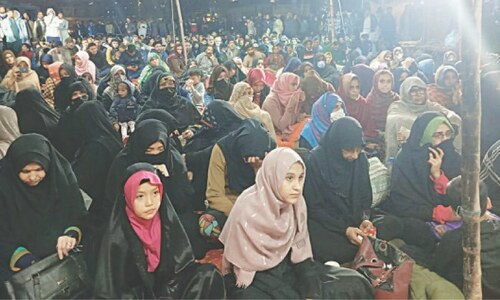KARACHI: A recent study has found most piped water samples collected from three different areas of Korangi town contaminated with faecal matter.
In addition, the level of residual chlorine in these samples was below the World Health Organisation guidelines.
Titled ‘Prevalence of faecal contamination within a public drinking water supply system in district Korangi’, the study was conducted by Karachi University’s Institute of Environmental Studies. It was published in the Bulletin of Environment, Pharmacology and Life Sciences, an online journal of the Academy for Environment and Life Sciences, India.
The study was conducted by Aamir Alamgir, Sadia Hashmi, Omm-i-Hany, Khalid Mahmood and Syed Shahid Shaukat under the supervision of Dr Moazzam Ali Khan.
Under the study, a total of 35 drinking water samples were collected from district Korangi comprising Korangi, Landhi and Shah Faisal Colony. The results showed that only 11 per cent of the samples were fit for human consumption whereas 89pc samples were unfit as they were heavily loaded with microbial growth with low chlorine levels.
According to the study, 48.57pc samples were positive for E.coli (Escherichia coli), a large and diverse group of bacteria found in the environment, foods and intestines of people and animals.
Although most strains of E.coli are harmless, others can cause illness.
“The existence of E.coli apparently indicated that water is unfit for human consumption and these microbes led to different diseases. E.coli presence clearly points to faecal contamination and illustrates a possible contamination of enteric pathogens,” the study says.
The mean total coliform count was found to be 1,300/100 ml (Korangi), 1,800/100ml (Landhi) and 1,400/100ml (Shah Faisal Colony). The mean faecal coliform count was found 500/100ml (Korangi), 1,500/100ml (Landhi) and 600/100ml (Shah Faisal Colony).
The mean residual chlorine: 0.02mg/l (Korangi), 0.06mg/l (Landhi) and 0.09mg/l (Shah Faisal Colony).
The mean total faecal streptococci: 4/100ml (Korangi), 3.5/100ml Landhi and 4.8/100ml (Shah Faisal).
In accordance with the WHO guidelines, there should be no coliform in treated water.
The study suggests that water supplies should be examined regularly to confirm that they were free from the pathogenic microbes. Moreover, emphasis should be on monitoring chlorine in water supplies up to the consumer level.
“It is believed that the filtration plant and reservoirs are chlorinating water adequately and, while chlorine levels are, in most cases, adequate throughout the distribution network, they fall during storage in the underground and overhead tanks at the consumer end.
“This may be simply due to excessive storage time or an excess of organic material in the tanks, which are seldom, if at all cleaned by consumers. Besides, rusty and rusty sewerage pipelines are also a major source of the growth of microbes,” the study says.
According to the study, though chlorine is a well-established means of disinfection, some organisms are resistant to chlorine.
“The public health threat comes from sewage contamination which contains the highest concentration of E.coli (108-109 per 100ml). Drinking water contamination with pathogenic microbes has been responsible for causing serious water-borne diseases such as diarrhoea, typhoid, nausea and dysentery,” it says.
It was observed that during the study in a few cases the level of chlorine exceeded the maximum permissible limit which, according to the study, changed water properties.
Earlier, studies conducted by the KU institute in Orangi and Malir towns have also shown faecal matter contamination in water samples.
Published in Dawn, February 23rd, 2016












































